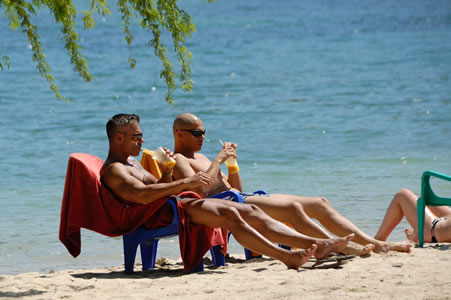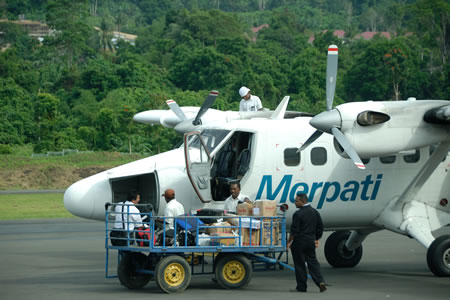

| The last stage in Indonesia | |
Dili (Timor Leste) to Kuala Lumpur (Malaysia), May-20-09 / Jun-15-09 |
|
Timor-Leste is a country that is washed over by a huge UN-stabilisation force, independent foreign advisers and a broad range of Non Governmental Organisations (NGO’s). Especially in the capital city of Dili, it is amazing to see how many jeeps are driving around with or the UN-logo on it, or the logo of one of the many active NGO’s. The economy of Dili mainly floats on the spending of the enormous amounts of foreigners that earn their money working for one of these organisation. As a result, the prices are inflated. A simple dish like a Nasi Goreng (fried rice) costs approximately US$ 4 in Dili, while the same dish costs much less that a Dollar in neighbouring West Timor (a province of Indonesia). The anticlimax is a Turkish restaurant that offers a simple chicken kebab with an awful service for the whopping amount of US$ 7.5! And still, a lot of UN personnel visit the place. The striking part of the story is that the people that are working for these organisations, do not shame themselves for the fact that they fill their pockets with tax money of others. The salary of a normal adviser to the government is lately limited to an amount of US$ 7,000. - per month. And if you know that the effective tax burden is only 10%, you realize that they earn a lot. The more serious and senior advisors, earn between 15,000 and 25,000 US$ per month! It wouldn’t be a shame if these guys and ladies would really work hard for their money and would help the country making steps forward. But the truth is different. Almost no steps are made and the biggest part of the working days are spent with eating and drinking at one of the beach cafes that focuses their business on the decadent UN-personnel and other ‘advisors’. Most of these (mainly) guys never left the capital city to take a look in the countryside to see what is going on and what really needs to be done. The country is blessed with enormous oil fields and that is what keeps the country functioning at this moment. Timor-Leste is politically reasonably stable, but economically it is a tragedy. Even after seven years of independence, they did not manage to create some kind of local industry. Everything is imported, mainly from Indonesia. Even simple products like mineral water and biscuits are coming from abroad. And if you fail to set up local production, you fail to create local jobs. And if you fail to create jobs for the people, you create poverty, which will at the end, result in unrest and riots. Especially when you have a very young population like Timor-Leste has. But if you confront the advisors with the fact that not much happens in this country, despite the fact that so many ‘advisors’ are present, they start smiling. “This is Timor-Leste” is what they say. “Everything needs time and if you want to speed things up, you’ll put your well-paid job at risk”, is their argument. And nobody wants to lose their over-paid job in this paradise. |
|
 |
|
The perfect job: UN-employee in Timor-Leste |
|
| Without any problems, the Indonesian embassy in Dili gives us another visa for sixty days. After spending more than a week in Timor-Leste, we travel back to Kupang in West Timor. There is one more thing we really want to see in Indonesia, and that are the Birds of Paradise on Papua. We buy two airplane tickets for the flight from Kupang, via Makassar on Sulawesi, to the city of Manokwari in the western part of Papua (called: “vogelkop”). Unfortunately, the only option is to fly with Merpati airlines, the airline that is most notorious for delays, cancellations and accidents. When we arrive at the airport of Kupang, we are happy to see that the first stretch of the journey will take place by a propeller airplane. Propeller airplanes are most of the time safer in these kinds of countries than jet planes, because they are easier and cheaper to maintain. We arrive safely in Makassar and also the second stretch of the journey with an old Boeing 737-200 of Merpati goes by without any problems. Manokwari is a typical Indonesian town. It is old and lacks atmosphere. There are also no sights of any interest and the town doesn’t give you any Papuan feeling. Because of the trans-migration policy of the Indonesian government, more than half of the present population of Manokwari has its roots outside Papua. | |
 |
|
Repairing a Merpati plane just before departure |
|
In Manokwari we have a meeting with Shita of the Papuan Bird Club. We got her phone number from the Sparrow-doctor that we met earlier during our trip on Ambon (see also the article: “On the way with the sparrow-doctor”). Shita tells us about a small village in the Arfak Mountains where a guide called Zeth, takes people on bird watching tours into the forests. Zeth was a poacher himself before, but now he realises that protecting the birds brings them more money in the long term than hunting the birds (see also the column: “Ecotourism in the purest form”). There is no hunting anymore in the forest that surround the village and that resulted in the survival of seven species in this small forest alone (see also the article: “In search for the Birds of Paradise”). We stay in the village for five days and go trekking in the forests for three days. Eventually, we see six out of the seven available species. After we came back from the Arfak Mountains, we decided what to do. There are some other interesting sites in Papua, but we had to admit that we are a little bit ‘tired’ of Indonesia. We spend more seven months in this country, and it is time to move on to a new place. We considered going also to the Baliem Valley in the heart of Papua, which is the main tourist draw of this province. Tourists go there to see the traditional Papuan people in their authentic cloth (like penis cases). But we also read about this area that is can be frustrating. Authenticity is gone (everything is a tourist show), unless you spend a lot of money and time to visit the more remote areas. And that is time and money we do not want to spend at this moment. It seems to be also an area where people try to rip you off as much as possible. Everything is overpriced and if you go on a trekking with a local guide, there is a chance that he does not want to finish the trekking unless you pay more than the agreed price. This is not the place we like to visit at this moment. We decide to leave Papua and keep the remaining part for the future. We definitely want to come back one day to visit the neighbouring country Papua New Guinea, which is presently too unsafe to visit. Maybe that is also the time to visit the Indonesian part of Papua again. But we are very happy that we saw the Birds of Paradise, and satisfied we fly back with Express Air to Jakarta. Fortunately, we also manage to connect to an Air Asia flight to Kuala Lumpur. So after a long day of flying, we said goodbye to Indonesia. But one day, they will see us again …
|
|
| © copyright - Babakoto.eu / 2009 | |